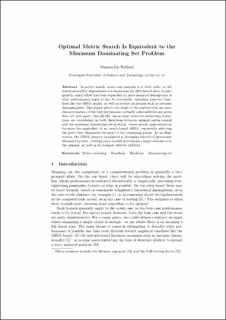| dc.description.abstract | In metric search, worst-case analysis is of little value, as the search invariably degenerates to a linear scan for ill-behaved data. Consequently, much effort has been expended on more nuanced descriptions of what performance might in fact be attainable, including heuristic baselines like the AESA family, as well as statistical proxies such as intrinsic dimensionality. This paper gets to the heart of the matter with an exact characterization of the best performance actually achievable for any given data set and query. Specifically, linear-time objective-preserving reductions are established in both directions between optimal metric search and the minimum dominating set problem, whose greedy approximation becomes the equivalent of an oracle-based AESA, repeatedly selecting the pivot that eliminates the most of the remaining points. As an illustration, the AESA heuristic is adapted to downplay the role of previously eliminated points, yielding some modest performance improvements over the original, as well as its younger relative iAESA2. | en_US |
